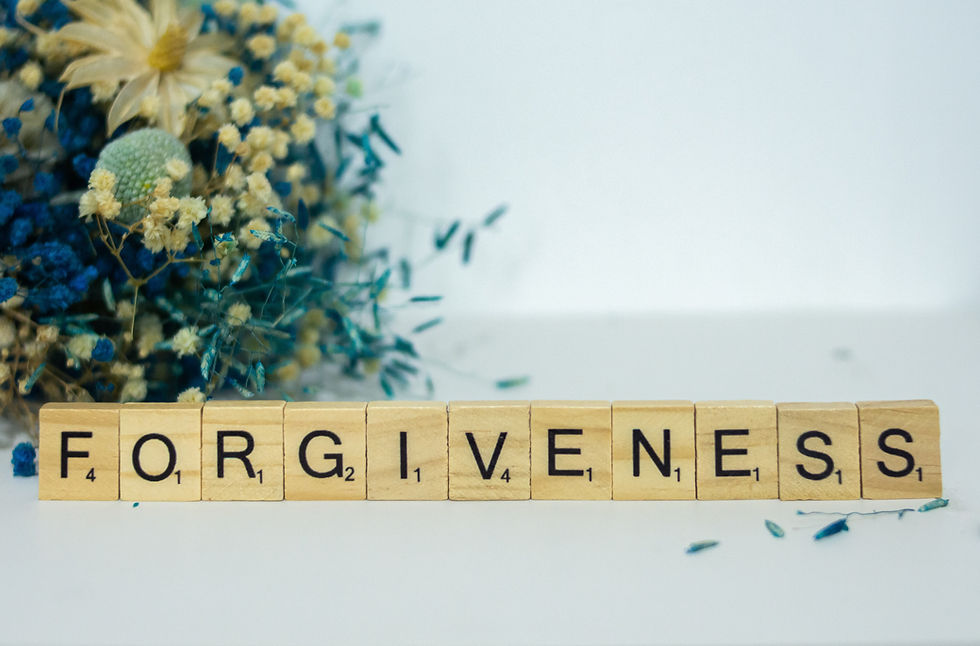You Want to Forgive… But You Can’t Seem to Move On (and that doesn't mean you're failing)
- Robin

- Jul 11, 2025
- 3 min read
You’ve told yourself,“I want to forgive.”You’ve tried to let go.You’ve journaled, meditated, maybe even had the hard conversations. They have made efforts to make amends and now the ball is in your court.
And still—something lingers. A heaviness. A sting. A part of you that just… can’t seem to move on.
Let’s talk about that. Because forgiveness is not a light switch.It’s not a moment. It’s a process—and sometimes, it’s a long one.

WHAT FORGIVENESS IS (AND ISN'T)
First, let’s clear up a common myth:Forgiveness is not the same as forgetting.It’s not excusing what happened.It’s not pretending it didn’t hurt.It’s not rushing past the anger or sadness just to “be the bigger person.”
Forgiveness is about releasing yourself from being emotionally stuck in someone else’s story.But here’s the catch: You can’t release pain you haven’t fully processed.
WHY IT'S SO HARD TO "JUST MOVE ON"
People often think: “If I want to forgive, why can’t I move on?”Here are a few reasons why:
1. The Hurt Is Still Unhealed
Wanting to forgive doesn’t erase the wound. If the hurt hasn’t been acknowledged, grieved, or validated, it’s going to keep asking for your attention.
2. There’s Still Unmet Accountability
If the person who hurt you hasn’t taken responsibility—or minimized the impact—it’s natural to feel stuck. You’re being asked to heal without justice.
3. You’re Trying to Rush Past Your Feelings
Many of us have been taught to skip straight to forgiveness. But real healing includes anger, confusion, grief, and even moments of resentment. You don’t have to perform peace before you’re ready to feel it.
4. You’re Carrying the Pressure to “Be Over It”
You might be trying to forgive because people are tired of hearing about it. Or because you think you should be tired of feeling it. But emotions don’t operate on deadlines.
YOU CAN FORGIVE AND STILL FEEL HURT
Forgiveness is not a destination where pain magically disappears. It’s often a choice you make over and over again, while still making room for your feelings.
You can:
Forgive someone… and still feel angry sometimes.
Forgive someone… and still have boundaries.
Forgive someone… and still decide they don’t have a place in your life.
Forgiveness is not a one-size-fits-all outcome.Sometimes, it’s simply saying:“I’m choosing to carry less of this—but I’m still allowed to feel the weight of what happened.”
MOVING FORWARD WITHOUT FORCING YOURSELF TO "MOVE ON"
So if you’re stuck in that space—wanting to forgive, but struggling to move on—consider this:
What part of you still needs tending before forgiveness feels safe or real?
Have you given yourself full permission to feel everything you feel?
Can you extend the same compassion to yourself that you’re working to extend to someone else?
Forgiveness is a gift you offer yourself—but only when you’re ready. And readiness isn’t weakness. It’s wisdom.
And remember: sometimes, the real work isn't in forgiving others—it's in forgiving yourself. For the ways you reacted while you were hurting. For not seeing the red flags sooner. For staying too long, or leaving too late. Self-forgiveness is often the most overlooked part of the healing process, yet it’s one of the most vital. You can’t fully let go of pain if you’re still blaming yourself for having felt it. Extending compassion inward can soften the sharp edges of grief—and gently open the door to something new.
FINAL THOUGHTS
You are not broken for struggling to forgive.You are not immature for feeling stuck.You are not a bad person because some part of you still hurts.
You’re healing. And healing takes time, gentleness, and truth.
So take your time.Feel it fully.And when you're ready—truly ready—you'll know.
And that will be enough.
Need support navigating forgiveness or emotional stuckness? Therapy can help you move forward at your own pace—with compassion and clarity. You don’t have to do it alone.




